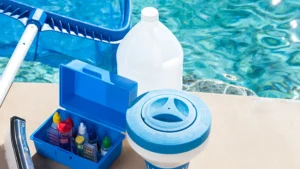
The short answer: no, you can’t catch the pool flu just by swimming in a pool. The influenza virus spreads mainly through person-to-person contact, like coughing, sneezing, or touching contaminated surfaces, not through properly treated pool water.
According to the Centers for Disease Control and Prevention (CDC), chlorine and other disinfectants used in pools kill most germs, including the flu virus, within minutes. So while you might pick up a sniffle from being around others at the pool, it’s not the water that’s to blame.
Think of it this way: the real risk is sharing a pool float with someone sneezing, not the splash itself.
Is the flu in your own backyard?
The short answer is yes. Germs that cause the flu and other illnesses do not have to organize elaborate campaigns to spread; a straightforward sneeze, cough or conversation is all that’s required to send invisible droplets landing on surfaces or being inhaled by someone else.
Anyone can unwittingly be the bad actor, whether a child, a coworker or a spouse. And yes, if that person has been in the pool — or even just lying by the pool on a towel — those droplets or contaminated surfaces could still transmit the virus to you.
The CDC warns that although the annual flu shot is your best protection, antiviral medications, in particular neuraminidase inhibitors such as oseltamivir (Tamiflu) or zanamivir, are effective if taken within 48 hours of the onset of symptoms. Not only do these treatments shorten the time that cold and flu-like symptoms last, but they also can lower the risk of hospitalization and death, so it’s a good idea to discuss them with your doctor if you believe you’ve been exposed.

Can I go in the pool with the flu?
Technically, you can go in the pool. But should you? That’s a different story. Think of it like bringing a tissue box to a dinner party: no one’s going to stop you at the door, but it’s not exactly the vibe people are hoping for.
Properly treated pool water (with chlorine and other disinfectants) should kill this particular bug (as well as most other germs), but the flu travels primarily through coughing, sneezing and even chatting a little too closely to a fellow swimmer. So the actual danger isn’t in the water, it’s in the air and the surfaces around the pool, that what we know as a pool flu.
Now here’s the kicker: if your pool isn’t kept clean, it can become a cozy hangout for other unwanted germs that chlorine hasn’t had the chance to zap yet. That’s why weekly maintenance is key to keeping your backyard oasis safe and sparkling. At Amenity Pool Services, we’ve got your back with a unique service: local pool techs who handle weekly cleanings so you don’t have to wait hours—or worse, days—for help.
That way, even if you’re stuck in bed with the flu, your pool won’t catch one too.
If you haven’t started planning, call your local pool service professionals. The staff can take care of your chemical balance and other maintenance duties while you’re out and about. You can get your flu shot and pool balanced at the same time.
Flu-like symptoms after swimming in pool
These aren’t always the actual swimmers flu, but they feel like it. Most are caused by pool chemicals, irritated airways, or germs from water that wasn’t maintained properly.
- Coughing & Wheezing: you ever left the pool and felt like you just did a winter marathon? That can be produced by inhaling pool chemicals such as chloramines, which turn into irritants in your lung.
- Stuffy or Runny Nose: The air in the pool (especially indoors) may cause you to start sniffing and sneezing, fooling you into believing you’re coming down with a cold.
- Sore Throat: Breathing in chemical-filled air can leave you with that scratchy ‘I need tea with honey’ kind of throat.
- Red, Watery Eyes: Not a fever per se, but irritated eyes can make you feel (and look) sick
- Tiredness & Body Aches: Other times, swimming makes you more than “pool tired,” because you become achy and are laid out like with flu-fatigue.
- Symptoms like Fever or Chills: If the water wasn’t clean, germs such as norovirus or crypto can lead to stomach illness which can have symptoms of fever and chills.
- Upset Stomach: Even ingesting a small amount of contaminated pool water may make you feel queasy or cause cramps and nausea similar to a flu stomach bug.
Ready to Keep Your Pool Flu-Free?

Don’t allow germs, chemicals or improper maintenance to turn your backyard into a “flu zone.” When you choose Amenity Pool Services, you’ll receive weekly local tech-crafted pool cleanings so your water is always sparkling, safe and ready to use without the wait.
Keep your swimming area clear with professional and reliable service, so you can relax beside your pristine pool throughout the warm summer season. Reserve your weekly cleaning schedule today, and your pool will be the healthiest hangout in town.
FAQ's
Chlorine is added to water to kill germs, but it does not work immediately. If used properly, chlorine can kill most germs within a few minutes. The CDC recommends maintaining a free chlorine concentration of at least 1 part per million (ppm) in pools and at least 3 ppm in hot tubs, with a pH level between 7.0 and 7.8 .
It varies depending on the virus and the pool’s upkeep. The flu virus is a fragile virus that does not survive well outside the human body. Within minutes most respiratory viruses are inactivated. But harder-to-kill bugs like norovirus or Cryptosporidium (crypto) can persist far longer — hours or even days — when chlorine levels dwindle or water chemistry is not balanced correctly. This is why regular testing and keeping your pool in pristine condition are vital.
“Swimmer’s flu” is not a medical term, but people say they have it when they encounter flu-like symptoms after swimming. These may be coughing, sore throat, stuck nose, drowsiness, or watery eyes. Often, however, these symptoms are caused not by flu but by: Chloramines (chemical byproducts that irritate the eyes and lungs in improperly ventilated pools).
Yes, technically, but you’re not supposed to. The virus is largely transmitted by droplets in the air and contaminated surfaces. That also means you can easily infect others in the vicinity of the pool. And, swimming while you’re sick can stress your body, delay the recovery and make the fatigue worse. If you’ve come down with the flu, you’ll be doing your body a favor by resting and hydrating, and by staying away from public places, pools included.
Absolutely. Pools with low chlorine or unbalanced water chemistry can become a breeding ground for bacteria, viruses, and parasites. Common pool-related illnesses include:
- Gastrointestinal infections (norovirus, crypto).
- Respiratory irritation (from chloramines).
- Skin or ear infections (like swimmer’s ear or rashes).
This is why weekly pool cleaning, testing, and proper filtration are essential for keeping swimmers safe.






